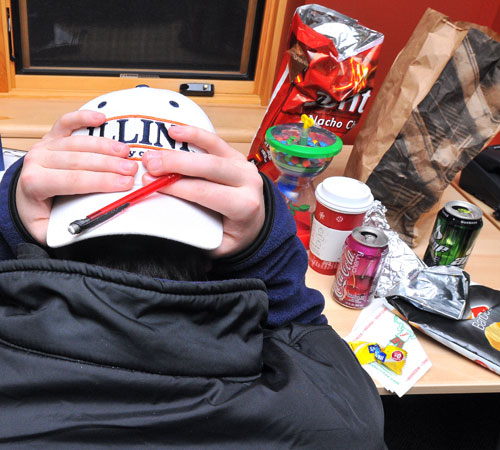Comfort food is not always comforting

Photo illustration by Wesley Fane The Daily Illini Erica Magda
December 4, 2008
Students scrambling to cram for their semester finals may gain more than just bruise-like circles under their eyes. The lack of structure can also lead to weight gain. Students may find themselves surrounded by huge portions of comfort foods and might be tempted to mindlessly overeat.
Where to go from here:
Without classes to walk or bike to, many students will camp out on the couch for the majority of winter break.
“As far as exercise goes,” she added, “you should be walking more than just the distance from the TV to the fridge.”
Physical activity not only helps prevent weight gain, it reduces stress and helps regulate hormones that control the appetite. Anyone who has seen the winter transformation of the chubby squirrels on campus knows that they should use it or lose it if they hope to keep a trim physique.
Get The Daily Illini in your inbox!
Without a set plan in mind before leaving for winter break, students might be tempted to adopt a “Michael Phelps”-like meal plan. The results could be disastrous.
“Students should try and eat every three to four hours when they are awake,” she said. Doing so keeps the body’s metabolism from dropping too quickly and keeps blood sugar levels from spiking. Ruot also advises students to never eat foods directly from their packages.
“You have no idea how much you’re eating,” she said. “Put foods in bowls or plates and walk away from it.”
It’s more important to maintain perspective and a fresh mentality toward each day, even if a person got hopped up and made some bad dietary decisions.
Frightening food facts
Chipotle steak burrito with everything: 1,173 calories, 51 g fat
Starbucks venti-sized Double Chocolaty Chip Blended
Frappuccino: 670 calories
Starbucks venti-sized Cinnamon Dulce Latte: 410 calories
12 oz. Cherry Coke: 140 calories
Flamin’ Hot Cheetos: 1 serving is 170 calories, 10 servings in a
bag, total of 1700 calories.
Reese’s Peanut Butter Cup: 130 calories each
1 cup eggnog: 345 calories
1 Rockstar Energy Drink: 140 calories
To burn the combined calories of these items, a 150-pound person would have to run 34 miles at a moderate pace.
Phil Nguyen, junior in Business, said it is more convenient to order food during finals because his schedule is so chaotic and his apartment has very little food left by that point.
“Since I stay up later, I could probably fit in a fourth meal,” he said, adding that snacking helps him stay awake and offers him an opportunity to procrastinate from studying.
Ruot said it is important for students to choose foods that have a high nutrient density, meaning the foods are nutritionally valuable and not merely empty calories. However, no one food will make someone gain weight unless they over-consume.
Nutritionist busts myths
Certified nutritionist Bethni Ruot puts to rest several myths about dieting and weight gain.
Myth: Eggnog, gingerbread cookies and pumpkin pie are all off-limits in order to prevent weight gain.
Busted: There are no certain foods to avoid. As long as students consider eating everything in moderation, they don’t have to deprive themselves, and they won’t overindulge.
Myth: Students should try to lose weight before the holidays in order to counteract any poor dietary decisions they might make.
Busted: Maintenance is much easier to take care of than to try losing weight over the holidays.
Myth: If a student doesn’t see weight-loss results right away, they might as well stop trying.
Busted: A lot of students get frustrated if they don’t lose the weight right away, but it’s usually a solid three months before they’ll see any kind of major results. Small healthy habits like staying physically active and being mindful of what one eats turn into lifestyle changes over time.






